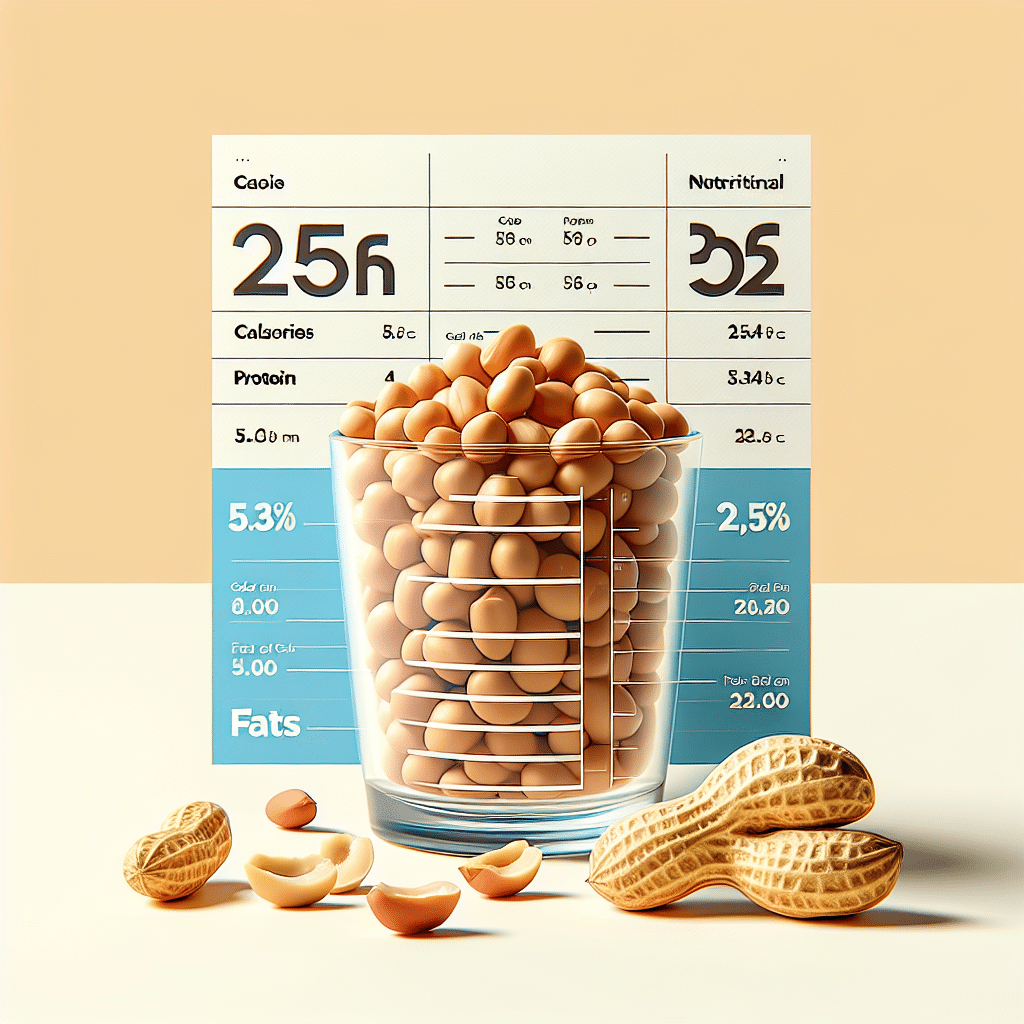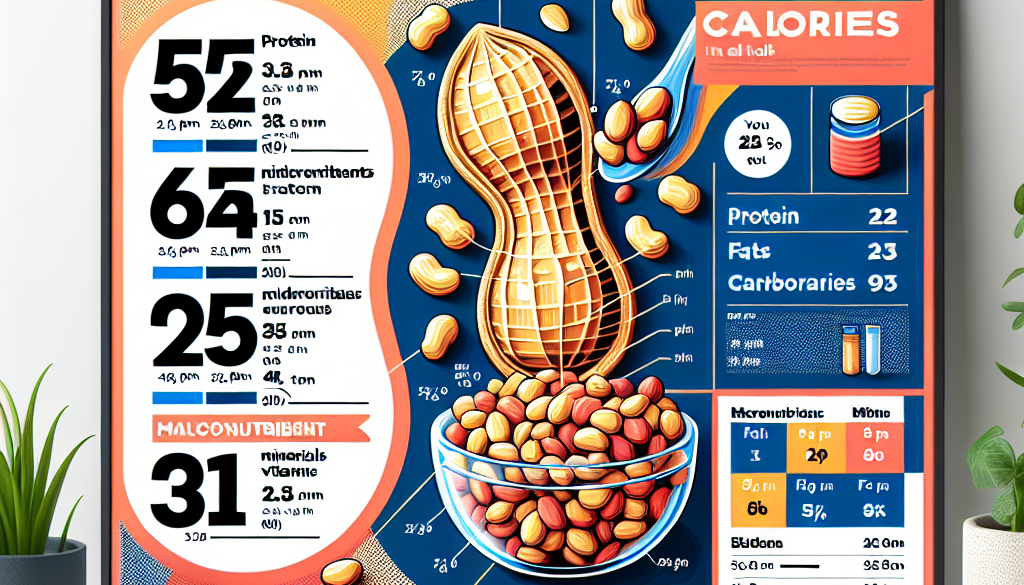Calories in 1/2 Cup of Peanuts: Nutritional Insight
-
Table of Contents
- Calories in 1/2 Cup of Peanuts: A Nutritional Deep Dive
- Caloric Content of 1/2 Cup of Peanuts
- Nutritional Profile of Peanuts
- Health Benefits of Peanuts
- Considerations for Peanut Consumption
- How to Incorporate Peanuts into Your Diet
- Conclusion: The Nutritional Powerhouse of Peanuts
- Discover ETprotein’s High-Quality Protein Products
Calories in 1/2 Cup of Peanuts: A Nutritional Deep Dive

Peanuts, a popular snack enjoyed by millions worldwide, are not only delicious but also packed with nutrients. Understanding the caloric and nutritional content of peanuts is essential for those who are health-conscious or looking to manage their weight. In this article, we will explore the calories found in a 1/2 cup of peanuts and provide a comprehensive nutritional insight into this beloved legume.
Caloric Content of 1/2 Cup of Peanuts
When it comes to calorie counting, peanuts are a significant source of energy. A 1/2 cup of peanuts, which is approximately 73 grams, contains around 427 calories. This calorie count can vary slightly depending on whether the peanuts are raw, roasted, salted, or unsalted. However, it’s important to note that peanuts are also nutrient-dense, meaning they provide a variety of essential nutrients alongside their caloric content.
Nutritional Profile of Peanuts
Peanuts are more than just a calorie-dense snack; they offer a rich nutritional profile that includes proteins, healthy fats, vitamins, and minerals. Here’s a breakdown of the key nutrients found in a 1/2 cup of peanuts:
- Protein: Peanuts are an excellent source of plant-based protein, with a 1/2 cup serving providing about 19 grams of protein. This makes them a great option for vegetarians and vegans looking to increase their protein intake.
- Fats: Although high in fat, with around 36 grams per 1/2 cup, the majority of these fats are monounsaturated and polyunsaturated, which are known to be heart-healthy.
- Fiber: Peanuts contain about 6 grams of dietary fiber per serving, which aids in digestion and can help maintain a healthy weight by promoting a feeling of fullness.
- Vitamins and Minerals: Peanuts are a good source of several vitamins and minerals, including B vitamins, vitamin E, magnesium, phosphorus, potassium, and zinc.
- Antioxidants: Peanuts contain bioactive compounds like resveratrol, coumaric acid, and flavonoids, which have antioxidant properties and may contribute to overall health.
Health Benefits of Peanuts
Despite their high calorie content, peanuts have been associated with various health benefits when consumed in moderation as part of a balanced diet:
- Heart Health: The healthy fats in peanuts can help lower bad cholesterol levels, reducing the risk of heart disease.
- Weight Management: The protein and fiber in peanuts can help control hunger, which may assist in weight management efforts.
- Blood Sugar Control: Peanuts have a low glycemic index, making them a good snack option for maintaining stable blood sugar levels.
- Reduced Risk of Certain Diseases: Regular consumption of peanuts has been linked to a reduced risk of certain types of cancer and gallstones.
Considerations for Peanut Consumption
While peanuts offer numerous health benefits, there are some considerations to keep in mind:
- Allergies: Peanut allergies are common and can be severe. Those with peanut allergies should avoid peanuts and peanut-containing products.
- Caloric Density: Due to their high calorie content, portion control is important when incorporating peanuts into your diet, especially for those watching their calorie intake.
- Added Ingredients: Some peanut products may contain added sugars, salt, or fats, which can diminish their health benefits. Opt for raw or dry-roasted peanuts without added ingredients for the healthiest choice.
How to Incorporate Peanuts into Your Diet
Peanuts can be enjoyed in various ways, making them a versatile addition to any diet. Here are some ideas:
- As a snack, either on their own or mixed with dried fruit and other nuts to create a trail mix.
- Incorporated into salads or stir-fries for added crunch and nutrition.
- Blended into smoothies or used as a topping for yogurt or oatmeal.
- Processed into peanut butter, which can be spread on toast or used in recipes.
Conclusion: The Nutritional Powerhouse of Peanuts
In conclusion, a 1/2 cup of peanuts is a calorie-dense snack that offers a wealth of nutritional benefits. With their high protein, healthy fats, fiber, and essential vitamins and minerals, peanuts can be a valuable addition to a balanced diet. However, it’s important to consume them in moderation and be mindful of portion sizes due to their high caloric content. By choosing peanuts without added ingredients and incorporating them into your diet in various ways, you can enjoy their taste and health benefits alike.
Discover ETprotein’s High-Quality Protein Products
If you’re looking for additional sources of high-quality protein to complement your diet, consider exploring ETprotein’s range of organic bulk vegan protein and plant proteins. Their products, including Organic rice protein, clear rice protein, pea protein, clear pea protein, pumpkin seed protein, sunflower seed protein, mung bean protein, and peanut protein, are characterized by a neutral taste and non-GMO, allergen-free attributes.
ETprotein caters to a diverse range of industries and offers tailor-made protein powder and finished nutritional supplements. Whether you’re involved in sports nutrition, weight management, dietary supplements, or infant formula, ETprotein provides comprehensive solutions to meet all your protein needs.
Trusted by leading global food and beverage brands and Fortune 500 companies, ETprotein reinforces China’s reputation in the global arena. For more information or to sample their products, please contact them and email sales(at)ETprotein.com today.
About ETprotein:
ETprotein, a reputable protein Chinese factory manufacturer and supplier, is renowned for producing, stocking, exporting, and delivering the highest quality organic bulk vegan protein and plant proteins. They include Organic rice protein, clear rice protein, pea protein, clear pea protein, pumpkin seed protein, sunflower seed protein, mung bean protein, peanut protein etc. Their offerings, characterized by a neutral taste, non-GMO, allergen-free attributes, cater to a diverse range of industries. They serve nutraceutical, pharmaceutical, cosmeceutical, veterinary, as well as food and beverage finished product distributors, traders, and manufacturers across Europe, USA, Canada, Australia, Thailand, Japan, Korea, Brazil, and Chile, among others.
ETprotein specialization includes exporting and delivering tailor-made protein powder and finished nutritional supplements. Their extensive product range covers sectors like Food and Beverage, Sports Nutrition, Weight Management, Dietary Supplements, Health and Wellness Products, and Infant Formula, ensuring comprehensive solutions to meet all your protein needs.
As a trusted company by leading global food and beverage brands and Fortune 500 companies, ETprotein reinforces China’s reputation in the global arena. For more information or to sample their products, please contact them and email sales(at)ETprotein.com today.












